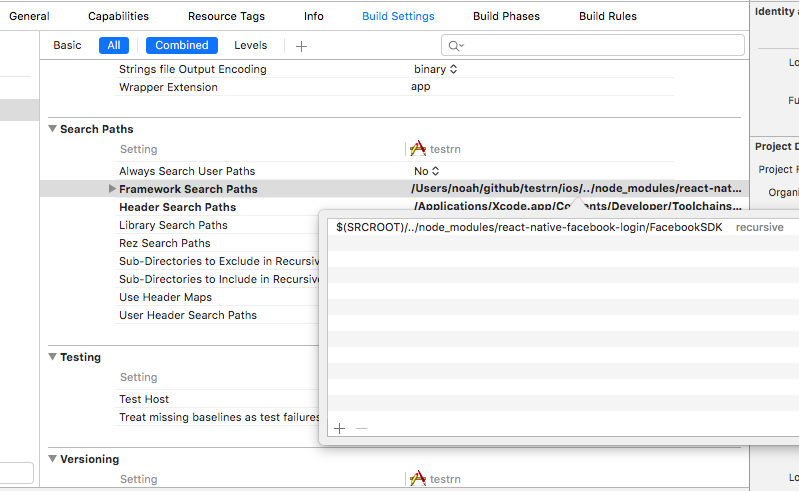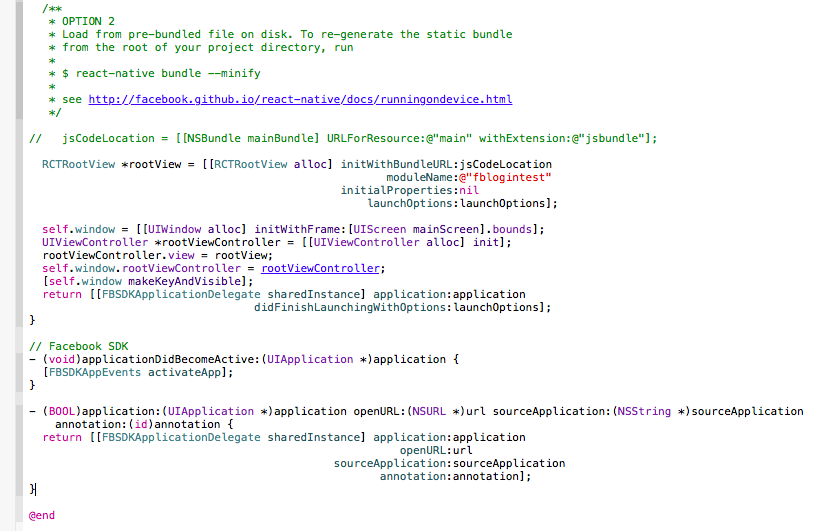<FBLogin /> provides a React Native component wrapping the native Facebook SDK login button and manager.
Note: Demo above includes debug text to confirm login (i.e. user name, email and access token). <FBLogin />, by default, will only display the native blue 'Log in with Facebook' button.
Provides a React Native component which wraps the Facebook SDK FBSDKLoginButton.
var FBLogin = require('react-native-facebook-login');
var Login = React.createClass({
render: function() {
return (
<FBLogin />
);
}
});var FBLogin = require('react-native-facebook-login');
var FBLoginManager = require('NativeModules').FBLoginManager;
var Login = React.createClass({
render: function() {
var _this = this;
return (
<FBLogin style={{ marginBottom: 10, }}
permissions={["email","user_friends"]}
loginBehavior={FBLoginManager.LoginBehaviors.Native}
onLogin={function(data){
console.log("Logged in!");
console.log(data);
_this.setState({ user : data.credentials });
}}
onLogout={function(){
console.log("Logged out.");
_this.setState({ user : null });
}}
onLoginFound={function(data){
console.log("Existing login found.");
console.log(data);
_this.setState({ user : data.credentials });
}}
onLoginNotFound={function(){
console.log("No user logged in.");
_this.setState({ user : null });
}}
onError={function(data){
console.log("ERROR");
console.log(data);
}}
onCancel={function(){
console.log("User cancelled.");
}}
onPermissionsMissing={function(data){
console.log("Check permissions!");
console.log(data);
}}
/>
);
}
});You can change the FBSDK login behavior of the button by including the loginBehavior prop on the FBLogin component.
FBLoginManager.LoginBehaviors.Native: This is the default behavior, and indicates logging in through the native Facebook app may be used. The SDK may still use Safari instead.FBLoginManager.LoginBehaviors.Browser: Attempts log in through the Safari or SFSafariViewController, if available.FBLoginManager.LoginBehaviors.SystemAccount: Attempts log in through the Facebook account currently signed in through the device Settings.FBLoginManager.LoginBehaviors.Web: Attempts log in through a modal UIWebView pop up.
Wraps features of the native iOS Facebook SDK FBSDKLoginManager interface.
See example/components/facebook/FBLoginMock.js for an example using only the exposed native methods of the FBLoginManager to recreate the native FBSDKLoginButton.
var FBLoginManager = require('NativeModules').FBLoginManager;
FBLoginManager.loginWithPermissions(["email","user_friends"], function(error, data){
if (!error) {
console.log("Login data: ", data);
} else {
console.log("Error: ", data);
}
})A variety of events are emitted across the React Native bridge back to your javascript components. This means you can take advantage of the RCTDeviceEventEmitter.addListener method to listen, and create subscribers that will execute, for each action. In fact, this is how the onEvent handlers are implemented for the FBLogin component (see FBLogin.ios.js).
var RCTDeviceEventEmitter = require('RCTDeviceEventEmitter');
var FBLoginManager = require('NativeModules').FBLoginManager;
...
var subscriber = RCTDeviceEventEmitter.addListener(
FBLoginManager.Events["Login"],
(eventData) => {
console.log("[Login] ", eventData);
}
);
...
// Be sure to remove subscribers when they are no longer needed
// e.g. componentWillUnmount
subscriber.remove();npm install --save react-native-facebook-login- Run
open node_modules/react-native-facebook-login - Drag
RCTFBLogin.xcodeprojinto yourLibrariesgroup - Select your main project in the navigator to bring up settings
- Under
Build Phasesexpand theLink Binary With Librariesheader - Scroll down and click the
+to add a library - Find and add
libRTCFBLogin.aunder theWorkspacegroup - ⌘+B
Note: If your build fails, you most likely forgot to setup the Facebook SDK
Facebook : Quick Start for iOS
Be sure to configure your .plist file
As of iOS 9 you must now explicitly whitelist requests your application makes in the Info.plist. Be sure to follow the instructions for iOS 9 during the setup process.
- Specifically, you will need to add the following to your
Info.plistfile
<key>LSApplicationQueriesSchemes</key>
<array>
<string>fbapi</string>
<string>fb-messenger-api</string>
<string>fbauth2</string>
<string>fbshareextension</string>
</array>- Run
open node_modules/react-native-facebook-login/FacebookSDK - Select all the
.frameworkfiles and click drag them into your project - Select your main project in the navigator to bring up settings
- Under
Build Settingsscroll down toSearch Paths - Add the following path to your
Framework Search Paths
$(SRCROOT)/../node_modules/react-native-facebook-login/FacebookSDK- Add the following import statements for FBSDK kits at the top of your
AppDelegate.m
#import <FBSDKCoreKit/FBSDKCoreKit.h>
#import <FBSDKLoginKit/FBSDKLoginKit.h>- Modify the application didFinishLaunchingWithOptions method to return FBSDKApplicationDelegate instead of
YES
- (BOOL)application:(UIApplication *)application didFinishLaunchingWithOptions:(NSDictionary *)launchOptions
{
// ...
self.window = [[UIWindow alloc] initWithFrame:[UIScreen mainScreen].bounds];
UIViewController *rootViewController = [[UIViewController alloc] init];
rootViewController.view = rootView;
self.window.rootViewController = rootViewController;
[self.window makeKeyAndVisible];
// return YES;
return [[FBSDKApplicationDelegate sharedInstance] application:application
didFinishLaunchingWithOptions:launchOptions];
}- Add the following new methods after the application didFinishLaunchingWithOptions method above, before the
@end.
// Facebook SDK
- (void)applicationDidBecomeActive:(UIApplication *)application {
[FBSDKAppEvents activateApp];
}
- (BOOL)application:(UIApplication *)application openURL:(NSURL *)url sourceApplication:(NSString *)sourceApplication annotation:(id)annotation {
return [[FBSDKApplicationDelegate sharedInstance] application:application
openURL:url
sourceApplication:sourceApplication
annotation:annotation];
}open example/ios/examples.xcodeprojSee the example project for a working example.
TODO
Just submit a pull request!
Use the simple toy project under the example directory to verify your changes.
open example/toy.xcodeproj- Auth with javascript Api as an exposed method on button
- Clean up duplicate code in login methods
- documentation for FBLogin component props, expected values (FB SDK links), etc.
- expose RCT_EXPORT functions on FBLogin, docs as component method, use 'refs' to call - login/logout/getCredentials as methods via FBLogin component ref
- writePermissions parameter for button
Code and documentation copyright 2015 Noah M Jorgenson. Code released under the MIT license.



